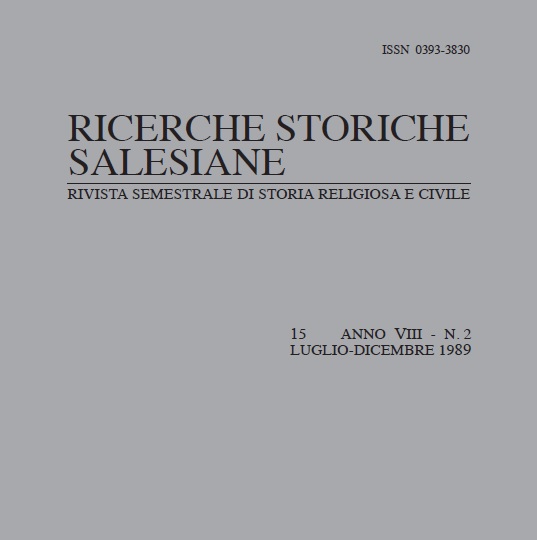The present article is offered as a contribution to a deeper understanding of the image of man as present in the educational ideas of Don Bosco. Despite the fact that his project had no theoretical foundation, it is clear that he had certain doctrinal nuclei which cannot be considered merely fortuitous or pragmatic. The Author bases his work on Don Bosco’s published writings and on his educational experience, which was far richer than any theoretical statements.
For Don Bosco the primary element in man was his religious destiny, his attitude to God. This is a point that education cannot ignore, and in consequence the first objective of the educational process must consist in helping the young person to be aware of this fact and practise the duties of a good christian.
But in Don Bosco there was also a sensitivity to the ‘human’ requirements of life, to values like “board, lodging and clothing”, work and culture, the use of free time, recreational activities and insertion in social life. These are not values or realities opposed to a religious attitude, and if in his writings he seems to give them secondary importance, in practice he frequently puts them forward as possible approaches to the faith itself. The first position is typical of educators formed in the restoration atmosphere and finds many antecedents in post-tridentine and 18th century spirituality. The second position is more modern and less traditional.
Il presente saggio si propone di contribuire all’approfondimento dell’immagine di uomo presente nel pensiero educativo di Don Bosco. Nonostante il fatto che in lui manchi una fondazione teorica del progetto educativo, egli evidenzia certi nuclei dottrinali che non possono essere considerati soltanto casuali o pragmatici. L’A. si base sugli scritti editi di DB e sulla sua esperienza educativa, indubbiamente più ricca delle enunciazioni teoriche.
Per Don Bosco l’elemento prioritario nell’uomo è il suo destino religioso, il suo orientamento a Dio. L’educazione non può non prenderne atto. Sicché l’obiettivo primario dell’intervento educativo deve consistere nell’aiutare il giovane a prender coscienza di questo fatto e a praticare i doveri del buon cristiano. Rimane tuttavia in Don Bosco la sensibilità per le esigenze ‘umane’ della vita, per valori quali «l’alloggio, il vestito e il vitto», per la cultura e il lavoro, per il tempo libero, le attivitàricreative e l’inserimento nella vita sociale. Non sono valori o realtà in contrasto con l’orientamento religioso. E se negli scritti spesso sembra incline a subordinarli, nella prassi sembra spesso proporli come possibili approcci alla fede stessa. La prima posizione è tipica degli educatori cresciuti nel clima della restaurazione e trova molti antecedenti nella spiritualità post-tridentina e del Settecento in modo particolare. La seconda posizione è più moderna e meno tradizionale.
Indice:
- Introduction
- I. The proper religious meaning of human existence
- II. Earthly realities
- III. The capacities of
- Conclusion
Reference time period: 1863 – 1886
J. Schepens, Human nature in the educational outlook of St. John Bosco, in «Ricerche Storiche Salesiane», 8 (1989) 15, 263-287.
Reference institution:
Istituto Storico Salesiano
